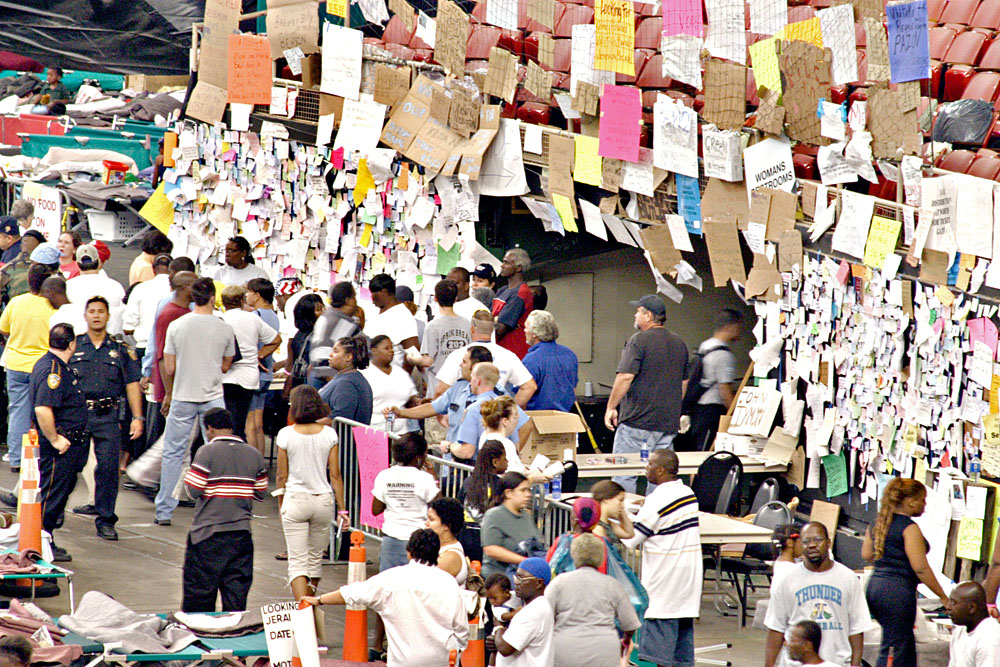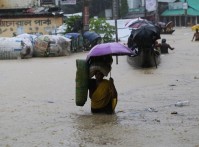-
Lessons From Katrina: Can Media-Citizen Collaboration Help Cities Adapt to Climate Risks?
August 17, 2015 By A. Adam GlennTen years ago this month one of the United States’ deadliest and most costly storms, Hurricane Katrina, struck the Gulf Coast. In Louisiana, the storied city of New Orleans was dealt a particularly devastating blow. Hundreds died and the city suffered extensive damage as 80 percent of its neighborhoods flooded, prompting an exodus it is still recovering from.
Yet New Orleans also offers examples of resilience. As the floodwaters rose, the city’s leading newspaper, The Times-Picayune, doggedly continued reporting and publishing, even as its headquarters were evacuated and many of its staff lost their homes.
Media organizations have an important public service obligationEqually laudable was the way the paper’s web site, NOLA.com, stepped up to aid the city’s tens of thousands of scattered residents. It created an impromptu missing persons forum that within weeks shared more than 17,000 posts that helped link lost friends and family. This small but crucial online initiative amid the devastation demonstrated something important: that local media and citizens can work together, using digital technology, to help a community address its most essential needs.
As the effects of climate change are felt by more and more people, newspapers and other media organizations have an important public service obligation to help communities understand and prepare for local impacts.
But how do we encourage more collaboration like this? Can we make deliberate what happened organically in New Orleans 10 years ago? How can media both help communities respond during immediate disasters and become more resilient to those in the future?
Harnessing Urban Vibrancy and Vulnerability
Governments at all levels are starting to recognize and respond to the need to create climate-resilient communities. But this is especially true in the world’s urban centers, where most people now live and where coastal flooding and storms are threatening to do the most damage.
Media organizations are often headquartered in urban areas, where they wield substantial influence. At the same time, inequities are most profound in cities, leaving poorer populations disenfranchised and more vulnerable to climate effects.
The very nature of urban centers – dynamic communities bristling with robust networks and energy, more abundant local media, and increasing vulnerability – may therefore provide a special opportunity for media-citizen collaboration to increase climate resilience.
Experimenting After Sandy
One test of this community-driven media approach is underway in New York. As a long-time journalist and faculty member at the City University of New York’s Graduate School of Journalism, I have been experimenting with various citizen-centered climate adaptation information services in the wake of Hurricane Sandy’s devastation in October 2012.
Among the project’s most promising results: A unique participatory workshop model for developing climate adaptation solutions.
A day-long event in New York last year brought together a deliberately diverse array of several dozen journalists, climate specialists, community organizers, and other experts in a hands-on brainstorming session to explore how to inspire their communities to be more involved in climate resilience solutions. Creative responses included public art projects to visualize climate risk and mobile resilience trucks to serve especially vulnerable populations. (Read more about the results and watch a public TV report.)
A similar program in Chicago later in 2014 trained journalists to bring such workshops to their own communities. And a new grant for the project will allow experimentation with workshops on a neighborhood level in New York.
A Call for Global Candidates
But many of the most vulnerable urban areas – and burgeoning media markets – are outside the United States. As well, we all stand to learn more by incorporating different perspectives on the same general set of problems. Identifying international candidate cities for these workshops is therefore the focus of my project as a public policy fellow here at the Wilson Center.
Where would benefit most from media-citizen collaboration?In addition to facing high climate risk, potential urban sites must meet baseline considerations that would allow such a project to be effective. For instance, is there an open press that can take part in deliberations? Is the local government functional, so that citizens can identify and lobby agencies to carry out their recommendations?
I’ll also be looking for places that might benefit most from media-citizen collaboration. Are those megacities, or smaller, newer urban centers, or the most vulnerable neighborhoods within cities, or even informal peri-urban areas? Should the project take a pan-regional approach built around a single issue, such as climate-related migration to megacities in developing countries? Or should it focus on a particular regional issue, such as medium-sized coastal cities across South Asia confronting flood risks?
There are numerous other challenges facing a successful collaboration. Will local officials speak openly at a workshop attended by news reporters? Will journalists balk at building resilience solutions with local residents? Will residents trust development and government officials as partners?
During the coming weeks, I’ll be exploring these questions, and I want to hear from you! Have ideas or suggestions for this project? Please share below in the comments or contact me directly at Adam.Glenn@WilsonCenter.org.
A. Adam Glenn is a public policy fellow at the Wilson Center and award-winning journalist, media consultant, and educator.
Sources: Adapt NY, The Data Center, Idea Lab, Intergovernmental Panel on Climate Change, MetroFocus, The New York Times, The Pulitzer Prizes, World Association of Newspapers and News Publishers, World Bank, World Health Organization.
Photo Credit: A man clings to the top of a van before being rescued after Hurricane Katrina in New Orleans, courtesy of Robert Galbraith/Reuters; A message board for displaced people after Hurricane Katrina in Houston, Texas, courtesy of Ed Edahl/FEMA.
 A Publication of the Stimson Center.
A Publication of the Stimson Center.








